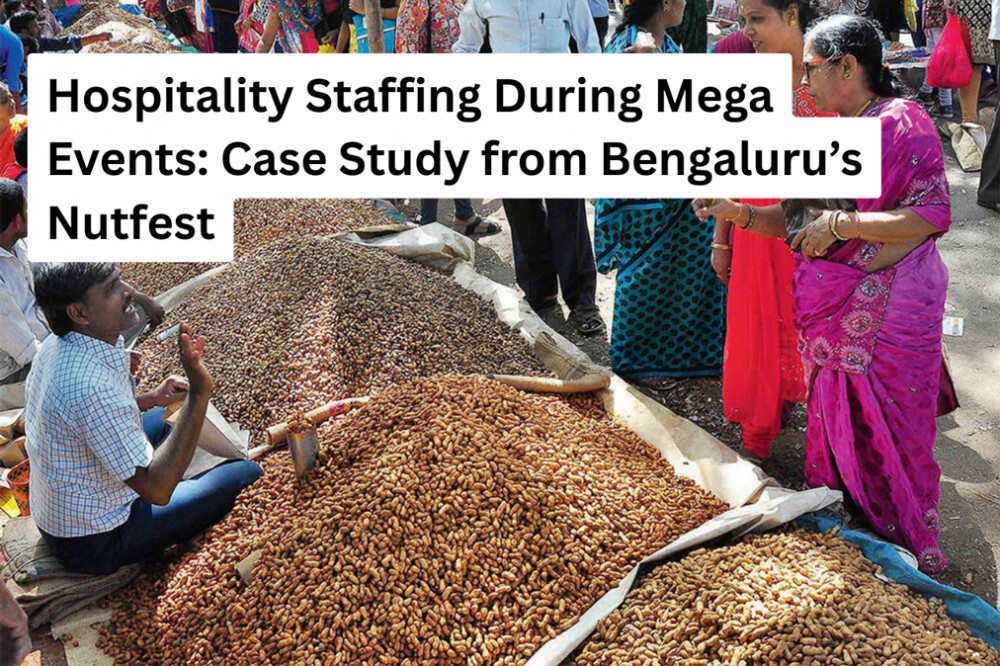
When to Hire vs Freeze Hiring During Festival Season

The Indian festive season is the season of opportunities and overload - spanning from Navratri and Diwali to Christmas and New Year—is more than just a period of celebration. In the hospitality sector, this is the busiest time of the year which also happens to be the most profitable. Hotels, restaurants, cafés, resorts, event spaces, and catering companies are all seeing increased business owing to greater travel, more eating out, and of course, weddings and business gatherings.
But while customer foot traffic is increasing the growth is complicated by a key question every year for the owner of a hospitality business:
Do we hire more staff or freeze hiring and try to get by with the existing staff?
Every year this question is a difficult one because the answer has an impact on operational efficiency, customer satisfaction, and to some extent profitability. Hiring too early could increase costs and reduce profitability, while freezing hiring may put pressure on the team and make guest experiences less than perfect.
Let's examine how Indian hospitality businesses can manage to be in the middle of knowing when to hire and when to take a pause during the festive season.
Understanding the Festive Season Pulse in Indian Hospitality
The festive calendar in India is an emotional ride for the hospitality service and when the calendar rolls around October till January, these emotions are heightened - It's family time, couples are on the road and companies are planning events to celebrate the year-end.
We see occupancy and F&B revenue increase as well, with establishments reporting footfall volume anywhere between 20% to 50%. September to January leads businesses to operational chaos - creating reservations, special menus, themed events, and institutionalized service expectations.
Recognizing this cycle allows leaders to connect staffing cycles proactively rather than reactively.
When to Hire: Scaling for Growth and Service Excellence
1. When Advance Bookings Suggest High Volume
When pre-booking sales for banquets, corporate parties, or holiday stays are near full capacity, it’s pretty clear you need to staff up soon.
Bringing on temporary help, beyond the permanent staff who can work overtime in front office, housekeeping, kitchen, or service teams can be a creative way to allow your operations to flow smoothly when capacity spikes.
Tip: When planning for a busy time, find guidance in previous years to anticipate this season's needs. A 15-20% overall increase in pre-bookings is typically enough to support proportionate staff increases.
2. When Customer Experience Is Your Unique Brand Value Proposition
When customer experience is a risk that could impact your reputation in light of the way reviews shape guest perceptions of your hotel, maintaining service moments is not worth the risk of overloading staff. If your hotel exists in a category where the brand relies on the quality of individual attention that is provided (boutique hotels) or fine-dine restaurant experiences, gradually loading your staff with too much to do could lead to quickly lost uniqueness.
Staffing up in advance of busy periods enables staff to deliver consistent service delivery, better wait times, and ultimately happier guests.
3. When Managing Multiple Properties or Events
Much of the hospitality supplies and brand activity takes place over several sites during festivals. Responsible for logistics, delivery, and service at multiple sites requires flexibility and agility.
The best way to meet this demand is to bring in temporary or contracted workers to manage increased demand and maintain flexibility.
4. When Introducing Seasonal Menus and Experiences
Festivals, like the holidays, are also times of new innovation. Many restaurants will finalize special menus, pop-ups, and themed elements around them. The preparation will take additional kitchen and service staff and would be supplementary as well to support mixology, event work, etc.
Again, when the logistics have been determined, the hiring can be strategic for the execution of the ideas and contribution to new ideas. It's never a good thing when your staff is too stretched.
5. When Employee Burnout Turns into a Liability
The hospitality business is a high-energy business. Long days and long shifts and working several days in a row can lead to burnout quickly. Hiring part-time or shift employees can alleviate some workload, decrease turnover, and boost morale—especially when full-time employees are already working overtime.
When to Stop Hiring: Managing Costs and Growing Efficiency
Hiring isn’t always a solution. Sometimes it is better to stabilize the current team, improve performance, and work to increase efficiency than to increase the payroll—especially when margins are slim or uncertainty is on the horizon.
Here’s when you should consider a hiring freeze instead.
1. When Demand is Seasonal, Not Sustainable.
If the demand for your business only lasts for a short stretch of time, as in the case of Diwali week, or Christmas Eve, it may not be warranted to add more staff.
In this instance, you may be better off training the existing staff in multiple roles. For example, servers can help arrange banquet setups or even front office associates have the opportunity to help with the festive event's check-in.
2. When Controlling Costs is a Necessity.
Many hospitality businesses operate with small profit margins and when the holidays arrive it typically means increased supplier costs, marketing costs, and price competition based on discounts.
The worst time to add to payroll costs is during that time of year. A simple hiring freeze and better weeks and smarter scheduling along with performance incentives may help relieve some of the financial burden and keep profitability intact and guests satisfied.
3. When Technology Can Be An Efficiency Enhancer
With tools such as a digital check-in or automated POS system, technology has become a silent multiplier of workforce efficiency. Instead of adding labor, many progressive hotels and restaurants now use a digital platform to speed up billing, table management, inventory tracking, and feedback collection.
Not only does this save money, but it also simplifies the process after the rush of the festival is long over.
4. When Teams Are Going Through Transition or Training
If your organization is still experiencing restructuring, leadership transition or new systems - a new employee could subject the org to additional unnecessary confusion. A short employee hiring pause allows teams to stabilize and learn to adapt prior to adding or scaling again.
Sometimes, especially when teams are going through transition or training, it is best to focus on skills development or internal promotions.
Finding Balance: The Hybrid Hiring Approach
A hybrid hiring approach, combining temporary hiring and role optimization, is a worker model for many successful hospitality brands.
Here’s what that might look like:
- Permanent Core Team: Handles critical brand-related roles including guest relations, chefs, and floor managers.
- Temporary Workers: Supports functions with temporary workers, with high demand and controllable hourly and task-based functions, such as service, housekeeping, and events.
- Technology: Reduces manual labor load and increases response time for the organization in real time.
Thus, a hybrid approach for hiring functions is multi-purposed without long-term commitment—in terms of liability—with the benefits of the organization and flexible temporary labor.
The festive season in India is both a blessing and a test for the hospitality industry. The temptation to over-hire—or under-hire—can be strong, but strategic planning is the real differentiator. Stay connected with Foodism Connect for more such insights!
Related Blogs

The Rise of Boutique Hotels: Recruiting for Experience, Not Size
73 Views

Top 5 Hospitality Roles Most in Demand This Quarter
71 Views

Hospitality Staffing During Mega Events: Case Study from Bengaluru’s Nutfest
86 Views

Festival Hospitality: What Food Events Teach About Guest Management & Staffing
194 Views

Little Guests, Big Smiles: How Hotels Design Family-Friendly Experiences
170 Views